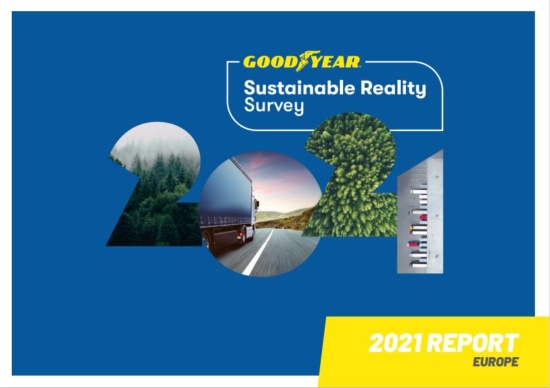Goodyear survey suggests fleets embracing climate challenges

This year, Goodyear asked fleet operators in Europe for their views on issues related to sustainability and what they’re doing to reduce carbon footprint. A total of 985 fleets from 36 European countries responded during August and September 2021, and the results of this 2021 Goodyear Sustainable Reality Survey are now out and available from Goodyear upon request. Responses suggest that sustainability has a significant prominence for operators in the transportation industry.
The European Green Deal of 2019 targets a 90 per cent reduction in greenhouse gas emissions from transport compared with 1990 levels, and CO2 emissions of new heavy trucks, as measured by VECTO, are to be reduced by 15 per cent in 2025 and 30 per cent by 2030. In addition, more and more end-customers and investors are opting and rewarding companies with a clear corporate social responsibility strategy.
Sustainable transportation high on the agenda
According to the responses Goodyear gained, companies of all sizes are giving increased weight to the importance of more environmental practices. Three-quarters of all respondents recognised sustainability as an important or very important issue. Over half of fleets with 101 or more vehicles stated that this is an intrinsic part of their company values.
“The responses to the 2021 Goodyear Sustainable Reality Survey are very encouraging and underline that environmental sustainability is high on the industry’s agenda. Besides the increased focus on emission reduction while manufacturing new vehicles, fleet managers are clearly taking actions. They are responding to climate challenges in a positive way to meet carbon reduction targets and support the move towards a climate-neutral future,” says Maciej Szymanski, director of marketing for Goodyear’s Commercial Business Europe.
Clear sustainability goals
Fleets over 500 vehicles are leading the way by incorporating an environment focused culture in their daily operations, and 70 per cent of larger fleets indicate they’ve also defined clear green goals. Four out of five surveyed fleets say they’ll have sustainability KPIs in place by autumn 2022, representing an increase of 38 per cent on today.
“While the industry moves towards a greener future it is also at a critical point as transportation and logistics providers across Europe are facing fluctuations in demand and increasing operational challenges marked by time and cost pressures as well as augmented complexity. We see a clear need for straightforward solutions meeting both sustainability and efficiency goals. To further accelerate the move, it is key to make sustainability a given,” says Szymanski.
Incentives important
One of the most common actions for fleets to make is the renewal of vehicle parcs, with 68 per cent of operators refreshing their fleet with cleaner options. Alternative drive trains are on the rise: Amongst fleets with over 500 vehicles, 43 per cent are switching to electric, hybrid, or LNG-powered vehicles.
Additionally, about sixty per cent of fleets are already using more fuel-efficient tyres. In this context, Goodyear points out it is supporting truck manufacturers and transportation companies in their move towards a greener future with products such as the recently launched Goodyear Fuelmax Endurance.
To further decrease their carbon footprint, 42 per cent of the surveyed fleets say they utilise retreading. With the tyre casing reused and less raw materials, waste and energy involved in the production process, this is another straightforward solution for fleets to lower their carbon footprint. Goodyear’s retreading uses the same quality treads as for its new tyres, thus offering similar performance.
Additional measures to improve fleet environmental sustainability include the optimisation of driver behaviours such as eco-driving techniques. 55 per cent of operators already employ this practice, with the setting of fuel consumption objectives also underway.
45 per cent of the fleets surveyed confirm their familiarity with upcoming environmental legislation applicable to the transportation industry, including environmental incentives and taxation schemes, in addition to other more restrictive regulations.
Financial incentives such as tax breaks are key motivators for more than 70 per cent of questioned fleets. A third of surveyed companies view sustainability as a way to reduce operating costs.
Cost & complexity putting a brake on green mobility
Cost is a main factor blocking greater sustainability action, with more than 60 per cent of respondents indicating that some solutions are too expensive. 79 per cent of fleets with more than 500 vehicles report they’d be encouraged to undertake further improvements if financial incentives were available.
Sustainability can be complex too, and 45 per cent of companies state that integrating more sustainable solutions into their everyday activity is simply to complicated. However, haulers recognise the power of data-intelligence: 54 per cent of operators now implement telematic solutions to help improve fuel efficiency and reduce emissions.
Goodyear points out that its full suite of one-stop tyre and fleet management solutions can be easily integrated into fleet operations. Drive-Over-Reader and DrivePoint provide automated tyre analysis in seconds every time a vehicle visits the yard. Goodyear TPMS gives real-time data to operators and allows full connectivity to ZF’s Transics-branded FMS (FleetManagementSolutions) portfolio including a web-based back-office solution and portal providing insights into the technical performance and health of the trailer park.




Comments